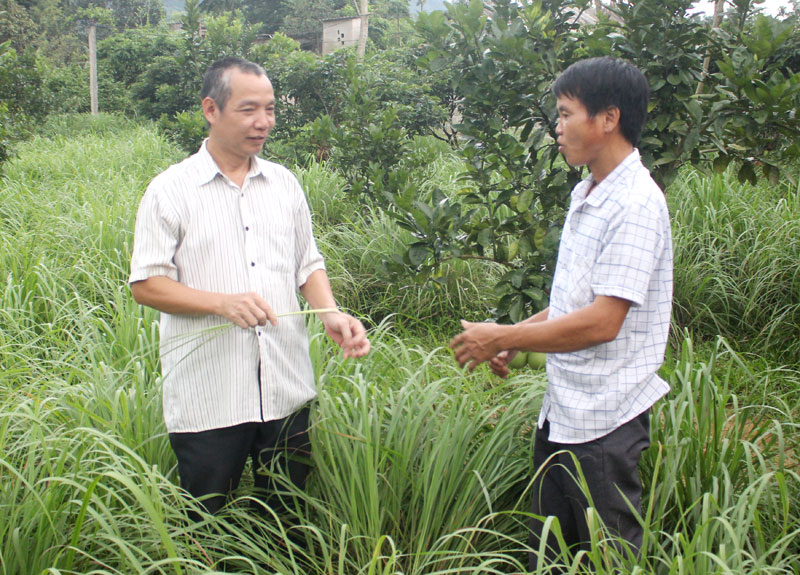
(HBO) - Secretary of Hung Tien commune’s Party Committee Bui The Vuong, the commune started growing lemongrass in 2003 when a few farmer households in Ba Bi village planted and sold the product on a small scale.
 Leaders of the Huy Chi cooperative in Hung
Tien commune, Hoa
Binh province’s Kim Boi district, discuss ways to improve economic
efficiency of lemongrass growingand processing with local people.
Leaders of the Huy Chi cooperative in Hung
Tien commune, Hoa
Binh province’s Kim Boi district, discuss ways to improve economic
efficiency of lemongrass growingand processing with local people.
In 2015, after a trader came to install a lemongrass
essential oil extraction machine, local villagers had soon realised
the potential of lemongrass business, which generates revenue five times higher
than rice farming on the same area. So the villagers began expanding the
plant’s growing areas.
The commune has so far cultivated 80 hectares of
lemongrass across four out of its five villages but it still can not supply
enough for the market.
In early 2018, the commune’s Party Committee and People’s
Committee decided to make lemongrass one of the local key agricultural products
and provided over 40 million VND in financial support for 34 lemongrass growers
to scale up their production.
The Huy Chi cooperative was founded three years ago. It
started to cooperate with the villagers, helping them bring lemongrass
essential oil to the market. Many local farmer households
have escaped from poverty and even gotten rich from the lemongrass.
Local authorities and the cooperative have also made
lemongrass products and lemongrass essential oil the main product of the
nationwide programme "One Commune, One Product” (OCOP) between 2018 – 2020.
Lemongrass is a drought-resistant and pest-resistant
plant adaptable to grow in low hills, according to Bui Van Thong, a farmer from
Ba Bi village. The first harvest can be obtained after six months of cultivation, and farmers can harvest two crops per year, he explained. The lemongrass needs to
be replanted after three years.
The average output is 20 tonnes of lemongrass stalksand 10 tonnes of lemongrass leaves per hectare per crop, he said, adding his
family earns a profit of about 75 – 80 million VND from growing the plant.
He
said his family and others in the village grow lemongrass not only
on seperate fields but also together with citrus fruits following intercropping
method.
The expansion of lemongrass areas coupled with
improvement in productivity and profit from the lemongrass farming have been a
new way of developing agriculture in Hung Tien, helping local
people escape from poverty. To date, the commune’s poverty rate dropped to 18.5 percent with all lemongrass households lifted from the poverty
list.
Dao Village’s honey – a product certified with a 3-star OCOP (One Commune One Product) rating by Thong Nhat Agricultural Cooperative in Dao Village (Hoa Binh City) – is highly regarded by consumers for its quality, richness, and variety in packaging. The distinctively sweet taste of Dao Village’s honey leaves a lasting impression on anyone who has tried it.
In alignment with Project No. 07-DA/TU, issued by the Hoa Binh provincial Party Committee on November 1, 2021, Lac Thuy district has actively promoted investment and supported the sustainable development of its industrial and handicraft sectors during the 2021–2025 period. Alongside this, the district has remained committed to preserving and revitalising traditional craft villages.
Located in the northern part of Lac Thuy district, with a temperate climate and fertile soil, Phu Thanh commune has great potential and advantages in growing tea. The long-standing experience, combined with strict adherence to organic farming practices in the tea gardens, ensures that the dried tea products from Phu Thanh and Lac Thuy as a whole are sold out immediately upon production, providing a stable and prosperous life for the local people.
Amid efforts to streamline the administrative apparatus, Hoa Binh province has intensified measures to address challenges in land clearance, resettlement support, and infrastructure investment, aiming to speed up the progress of key projects.
Hoa Binh province has posted an unprecedented economic growth rate of 12.76% in the first quarter of 2025, marking its highest quarterly performance to date and positioning it as the second fastest-growing locality in the country, trailing only Bac Giang province.
Under current regulations, products in the One Commune – One Product (OCOP) programme that are rated three stars or higher must undergo re-evaluation every three months. However, in reality, some of these products fail to consistently meet the required standards, raising concerns about the sustainability of their OCOP certification. This underscores the urgent need for producers to enhance product quality and gradually develop their OCOP products into strong, marketable brands.



 Leaders of the Huy Chi cooperative in Hung
Tien commune, Hoa
Binh province’s Kim Boi district, discuss ways to improve economic
efficiency of lemongrass growingand processing with local people.
Leaders of the Huy Chi cooperative in Hung
Tien commune, Hoa
Binh province’s Kim Boi district, discuss ways to improve economic
efficiency of lemongrass growingand processing with local people.